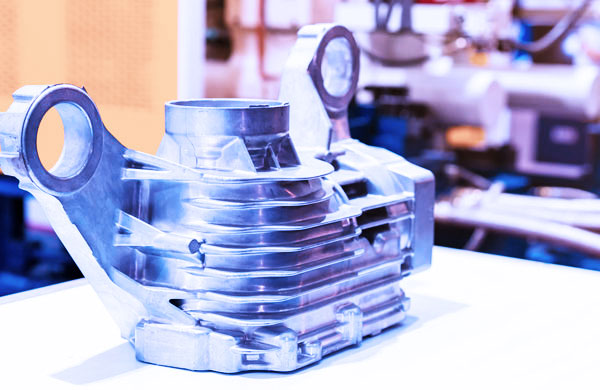Not known Details About Stahl Specialty Company
Not known Details About Stahl Specialty Company
Blog Article
The Basic Principles Of Stahl Specialty Company
Table of ContentsThe Buzz on Stahl Specialty CompanyThings about Stahl Specialty CompanyRumored Buzz on Stahl Specialty CompanyStahl Specialty Company Things To Know Before You BuyWhat Does Stahl Specialty Company Mean?
The subtle distinction lies in the chemical content. Chemical Comparison of Cast Light weight aluminum Alloys Silicon promotes castability by reducing the alloy's melting temperature and improving fluidity during casting. It plays a crucial role in allowing intricate mold and mildews to be filled up accurately. Additionally, silicon adds to the alloy's strength and wear resistance, making it useful in applications where toughness is important, such as vehicle parts and engine elements.It also enhances the machinability of the alloy, making it less complicated to refine right into ended up products. This way, iron adds to the total workability of light weight aluminum alloys. Copper boosts electrical conductivity, making it beneficial in electric applications. It also improves rust resistance and adds to the alloy's total stamina.
Manganese adds to the strength of light weight aluminum alloys and improves workability. It is generally used in functioned light weight aluminum items like sheets, extrusions, and accounts. The visibility of manganese aids in the alloy's formability and resistance to cracking during manufacture procedures. Magnesium is a lightweight aspect that gives strength and influence resistance to aluminum alloys.
It enables the manufacturing of light-weight components with excellent mechanical properties. Zinc improves the castability of light weight aluminum alloys and helps manage the solidification procedure throughout spreading. It boosts the alloy's toughness and hardness. It is typically located in applications where detailed shapes and fine details are needed, such as decorative spreadings and particular automobile components.
Facts About Stahl Specialty Company Revealed
Since aluminum-silicon alloys have good spreading residential or commercial properties, high gas residential properties, straightforward procedures, and exceptional deterioration resistance, aluminum-silicon alloys are most commonly utilized in the die-casting industry at home and abroad. At the exact same time, aluminum-silicon alloys are additionally fairly very early and extensively identified alloys established and utilized in die-casting. After constant study and improvement, a lot of the current worldwide mainstream aluminum-silicon alloys have actually been completed and are absolutely nothing even more than A356, A360, A380, ADC12, B390, and A413.
The main thermal conductivity, tensile strength, yield stamina, and elongation vary. Select appropriate basic materials according to the performance of the target item generated. Among the above alloys, A356 has the highest possible thermal conductivity, and A380 and ADC12 have the least expensive. The tensile limitation is the contrary. A360 has the very best yield stamina and the greatest elongation rate.

Rumored Buzz on Stahl Specialty Company
In accuracy casting, 6063 is fit for applications where detailed geometries and high-quality surface finishes are extremely important. Instances include telecommunication enclosures, where the alloy's superior formability enables smooth and aesthetically pleasing designs while keeping architectural honesty. In the Lights Solutions sector, precision-cast 6063 components develop elegant and effective lights fixtures that call for complex shapes and excellent thermal efficiency.
(http://go.bubbl.us/e742bb/4e3d?/Stahl-Specialty-Company)
It leads to a finer surface coating and much better deterioration resistance in A360. In addition, the A360 displays exceptional elongation, making it perfect for facility and thin-walled parts. In accuracy casting applications, A360 is well-suited for industries such as Consumer Electronic Devices, Telecommunication, and Power Tools. aluminum metal casting. Its boosted fluidness enables elaborate, high-precision components like mobile phone cases and interaction tool housings.

In accuracy spreading, light weight aluminum 413 shines in the Customer Electronics and Power Devices markets. It's frequently made use of to craft complex parts like smartphone real estates, electronic camera bodies, and power device cases. Its accuracy is impressive, with limited tolerances aluminum foundry as much as 0.01 mm, making certain perfect product assembly. This alloy's superior deterioration resistance makes it an exceptional selection for outside applications, guaranteeing durable, sturdy products in the pointed out sectors.
8 Simple Techniques For Stahl Specialty Company
Once you have chosen that the light weight aluminum die casting process appropriates for your task, a crucial next step is picking one of the most suitable alloy. The light weight aluminum alloy you select will substantially impact both the spreading procedure and the buildings of the end product. Because of this, you need to make your decision carefully and take an enlightened technique.
Establishing the most appropriate light weight aluminum alloy for your application will indicate evaluating a large range of qualities. The very first classification addresses alloy characteristics that affect the manufacturing procedure.
The alloy you select for die spreading directly affects several elements of the casting process, like just how very easy the alloy is to collaborate with and if it is prone to casting flaws. Warm splitting, additionally referred to as solidification cracking, is a regular die spreading defect for light weight aluminum alloys that can lead to inner or surface-level splits or cracks.
The Best Strategy To Use For Stahl Specialty Company
Certain light weight aluminum alloys are extra prone to hot fracturing than others, and your selection needs to consider this. One more common issue found in the die spreading of aluminum is die soldering, which is when the cast sticks to the die walls and makes ejection hard. It can damage both the cast and the die, so you ought to seek alloys with high anti-soldering properties.
Corrosion resistance, which is already a noteworthy quality of light weight aluminum, can vary significantly from alloy to alloy and is a vital characteristic to think about depending on the ecological problems your product will certainly be subjected to. Use resistance is one more property commonly looked for in aluminum items and can distinguish some alloys.
Report this page